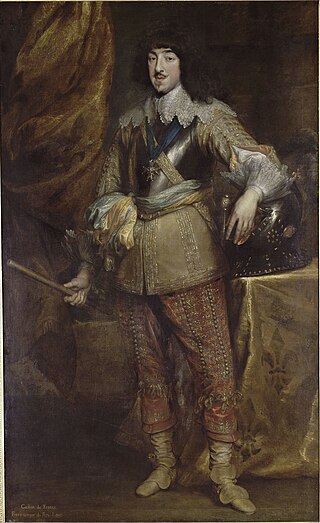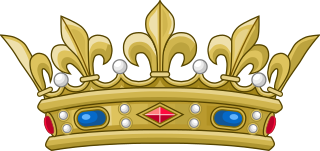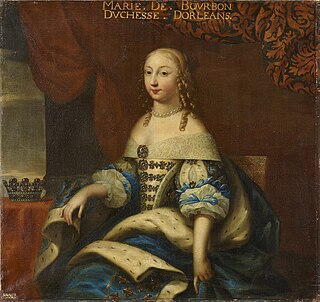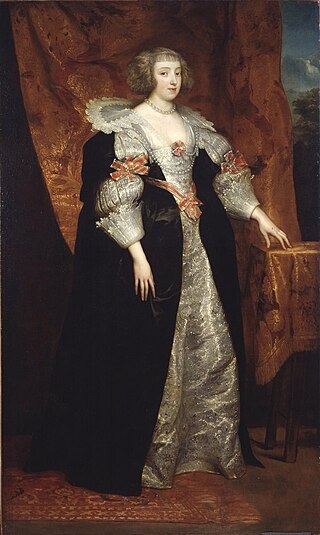The grand ducal family of Luxembourg constitutes the House of Luxembourg-Nassau, headed by the sovereign grand duke, and in which the throne of the grand duchy is hereditary. It consists of heirs and descendants of the House of Nassau-Weilburg, whose sovereign territories passed cognatically from the House of Nassau to the House of Bourbon-Parma, itself a branch of the Spanish royal house which is agnatically a cadet branch of the House of Capet that originated in France, itself a derivative dynasty from the Robertians and the Karlings and the founding house of the Capetian dynasty.

MonsieurGaston, Duke of Orléans, was the third son of King Henry IV of France and his second wife, Marie de' Medici. As a son of the king, he was born a Fils de France. He later acquired the title Duke of Orléans, by which he was generally known during his adulthood. As the eldest surviving brother of King Louis XIII, he was known at court by the traditional honorific Monsieur.

MonsieurPhilippe I, Duke of Orléans was the younger son of King Louis XIII of France and Anne of Austria, and the younger brother of King Louis XIV. He was the founder of the House of Orléans, a cadet branch of the ruling House of Bourbon.

The House of Montmorency was one of the oldest and most distinguished noble families in France.

Duke of Châtellerault is a French noble title that has been created several times, originally in the Peerage of France in 1515. It takes its name from Châtellerault, in the Vienne region.

Fils de France was the style and rank held by the sons of the kings and dauphins of France. A daughter was known as a fille de France.

The 4th House of Orléans, sometimes called the House of Bourbon-Orléans to distinguish it, is the fourth holder of a surname previously used by several branches of the Royal House of France, all descended in the legitimate male line from the dynasty's founder, Hugh Capet. The house was founded by Philippe I, Duke of Orléans, younger son of Louis XIII and younger brother of Louis XIV, the "Sun King".

The House of Croÿ is an old European noble family of princely and historically sovereign rank, which held a seat in the Imperial Diet from 1486, and was elevated to the rank of Princes of the Holy Roman Empire in 1594. In 1533 they became Dukes of Arschot and in 1598 Dukes of Croy in France. As a former ruling and mediatized family, it belongs to the Hochadel. In 1913, the family had branches in Belgium, France, Austria and Prussia.

Gaston IV was the sovereign Viscount of Béarn and the Count of Foix and Bigorre in France from 1436 to 1472. He also held the viscounties of Marsan, Castelbon, Nébouzan, Villemeur and Lautrec and was, by virtue of the county of Foix, co-prince of Andorra. From 1447 he was also Viscount of Narbonne. Through his marriage to Eleanor, heiress of the Kingdom of Navarre, he also held the title of Prince of Navarre.

Louise of Lorraine was a French noblewoman and member of the House of Lorraine. She married into the House of La Tour d'Auvergne and was Duchess of Bouillon. At court she was associated with the princesses combinées.

Marie de Bourbon, Duchess of Montpensier, Princess of Dombes and Duchess of Orléans by marriage, was a French noblewoman and one of the last members of the House of Bourbon-Montpensier. Her parents were Henri de Bourbon, Duke of Montpensier and Henriette Catherine de Joyeuse, Duchess of Joyeuse in her own right.
Le Voyageur sans bagage is a 1937 play in five scenes by Jean Anouilh. Incidental music for the original production was written by Darius Milhaud and for the play's first Paris revivals by Francis Poulenc.

The House of Bourbon-Montpensier or Maison de Bourbon-Montpensier was a semi royal family. The name of Bourbon comes from a marriage between Marie de Valois, comtesse de Montpensier (1375–1434) who married Jean de Bourbon - the duc de Bourbon. The second name of Montpensier, comes from the title of the family.

Marguerite of Lorraine, Duchess of Orléans, was the wife of Gaston, younger brother of Louis XIII of France. As Gaston had married her in secret in defiance of the King, Louis had their marriage nullified when it became known. On his deathbed, Louis permitted them to marry. After their remarriage, Marguerite and Gaston had five children. She was the stepmother of La Grande Mademoiselle.
The Duchy of Joyeuse was created in 1581 by King Henry III of France for his favourite Anne de Joyeuse.

The House of Bethune is a French noble house from the province of Artois in the north of France whose proven filiation dates back to Guillaume de Béthune who made his will in 1213. This family became extinct in 1807 with Maximilien-Alexandre de Béthune, Duke of Sully (1784-1807).

The Castle of Beauvais is a French château located in the municipality of Lussas-et-Nontronneau, department of Dordogne, region of Nouvelle-Aquitaine, France. The castle was listed as a historic monument on 19 December 1973.

Emmanuel Boyer de Fonscolombe (1810–1875) was a French aristocrat and composer.

The House of Sabran was an illustrious Provençal family whose bloodline was extinguished in 1847 in the person of Elzéar-Louis of Sabran, general, who was made a hereditary peer of France in 1815, comte-pair (count-peer) in 1817, and duc-pair (duke-peer) in 1825. Among its members are two Catholic saints, three bishops, and five generals.















